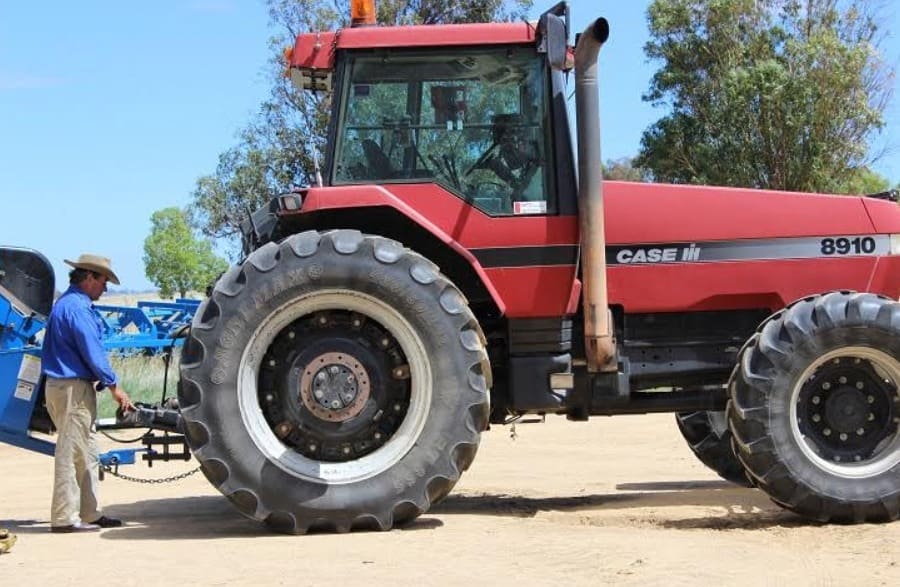
FARMERS intending to bring secondhand machinery into Victoria have been alerted to the crop, pasture and livestock biosecurity aspects of bringing equipment into the state.
Agriculture Victoria grains biosecurity officer Jim Moran said besides the costs of the machine and its transport, there are other costs involved in ensuring the machine meets Victorian biosecurity legislation (Plant Biosecurity Act 2010) and the Conditions of entry described in the Victorian Plant Biosecurity Manual.
He said used agricultural equipment and spare parts could pose a high risk to Victoria’s unique environment and agricultural industries.
“Given the nature of their work, there is a high possibility used machinery could harbor weeds, pests and diseases that we don’t want in Victoria.
“Therefore, unless they meet specific conditions of entry outlined in the Plant Quarantine Manual (PQM), they are prohibited from entry,” he said.
Mr Moran said Annual Ryegrass Toxicity (ARGT) is not in Victoria.
“ARGT host material includes cereal crops, first-cut lucerne, pasture hay, stock feed or plant waste and could be located anywhere in Western Australia, South Australia or New South Wales.
“Any machinery from these states must meet the specific conditions of entry to minimise any risk of introducing ARGT into Victoria.”
Mr Moran said Victoria is also free from the fungal disease, Lupin Anthracnose (LA).
“Important lupin growing states like SA and WA don’t have area freedom from LA and therefore, restrictions apply to the importation of machinery into Victoria from there.
“These (and other) biosecurity risks are carried in soil, animal or plant material found on or inside used farm machinery,” he said.
“Therefore, they must be thoroughly cleaned, free of plant material and visible soil, and inspected by a government officer.
“A Plant Health Certificate must then be issued before movement into Victoria,” Mr Moran said.
“There are costs and time involved with such a thorough clean, often requiring the partial dismantling of the machine or equipment to access all the hidden away, hard to get at areas.
“For example, debris is commonly found collecting in the driver’s cabin, on the chassis, in the grain bin, augers, belts, elevators, spreaders, choppers, tyres, rims, sieves, radiator and under any guards.”
Mr Moran said prospective purchasers should always check early with an Agriculture Victoria biosecurity officer before they sign up to import a used farm machine into Victoria.
“The import prohibition doesn’t apply if the host material is grown on, sourced from or last used on a property that is located in a state or territory for which area freedom exists.
“In the case of LA, this exemption currently applies for QLD, NSW, TAS and the NT, meaning the unrestricted importation of LA host material from these locations is allowed (provided no other quarantine restrictions apply),” he said.
“Currently QLD, TAS and NT have state freedom for ARGT so no permit or PHC is required for machinery from these states.
Agriculture Victoria tips for machinery buyers
- It’s the importer’s responsibility to ensure all imported, used agricultural equipment is thoroughly
clean prior to export and a PHC is obtained. The cost of dismantling, cleaning, and certifying a
grain harvester sometimes totalling over $10,000
- Used agricultural equipment found to be unacceptably contaminated on arrival will be re-exported
or subjected to an expensive cleaning process at the expense of the new owner
- Use an experienced machinery dealer who regularly imports from other states. Different dealers
offer varying support and services in the price they quote
- Don’t get stuck with a dirty machine. It’s a massive biosecurity risk to your farm and the grains
industry. If it doesn’t arrive clean, you will have to clean it before using it
- Practical and inexpensive farm biosecurity tactics are found at www.farmbiosecurity.com.au and
www.agriculture.vic.gov.au/biosecurity
- The Grains Farm Biosecurity Manual is found here:
grainsbiosecurity.com.au/resources/biosecurity-manual-for-grain-producers/
- Please contact Agriculture Victoria on 136186 for any biosecurity related matters.

HAVE YOUR SAY